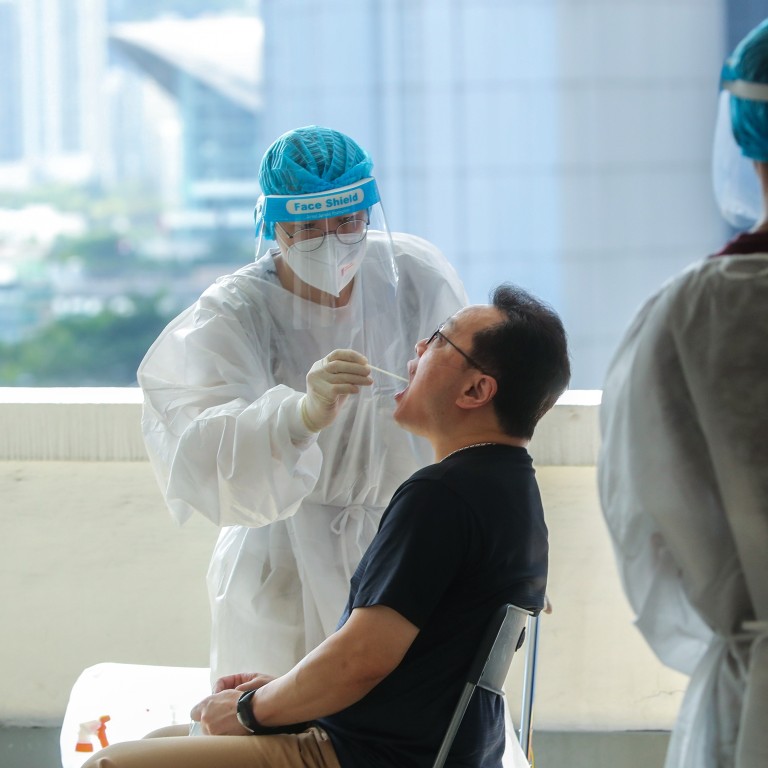
Hong Kong third wave: no symptoms or link to confirmed Covid-19 case? Getting tested will only overburden system, health official says
- More than 4,000 city residents have rushed to emergency departments and general clinics at public hospitals in the past week, authorities say
- But nearly everyone confirmed positive in recent surge has fit into one of the two categories, explain experts, who say test won’t provide ‘sense of security’
The Centre for Health Protection’s Dr Chaung Shuk-kwan made the appeal amid a recent flood of Hongkongers to public and private hospitals seeking virus tests.
“I urge those who do not have symptoms and are not linked to infected persons … do not rush to go take a test, as they will rob other urgent patients of the ability to get screenings,” Chaung said at a press conference.

Her comments echoed remarks by city health advisers Dr Keiji Fukuda, Dr David Hui Shu-cheong and Dr Yuen Kwok-yung, who said that taking a test without at least one of those factors at play would not grant residents “any sense of security” and could stretch health services.
“The test will only prove that you are negative at this moment, but it does not mean you will not get the virus the next day, if you have not passed the incubation period,” said Hui, a respiratory medicine expert at Chinese University.
I urge those who do not have symptoms and are not linked to infected persons … do not rush to go take a test, as they will rob other urgent patients of the ability to get screenings
As Hong Kong has seen infections mount – with 558 local cases since July 5 – residents have increasingly sought out tests at private and public hospitals in larger numbers.
The Hospital Authority said more than 4,000 Hongkongers visited emergency departments and general clinics in public hospitals seeking tests over the past week, despite the fact the authority was not providing certificates of health for asymptomatic individuals. Queues were also seen outside some private hospitals.
Speaking to the Post, Dr Hui said while he understood the public’s worries, the infection figures so far proved that positive coronavirus tests were very rare without symptoms or links to past confirmed cases.
Hong Kong third wave: kindergarten, international school years will not start until at least August 17 amid Covid-19 outbreak
He pointed to Sunday as an example, when 71 of 83 new local infections reported symptoms, while 11 of the asymptomatic cases were close contacts of earlier confirmed positives.
Only one case was both untraceable and had no symptoms, and even in that instance, the 65-year-old woman involved lived in a housing block where there had been an earlier infection, official data showed.
“People should not rush to the hospitals for testing unless you have symptoms or you were close contacts [with an infected person]. It will increase the burden on our health care systems,” Hui said.
“We encourage people with symptoms like respiratory disease and epidemiological linkages with earlier confirmed cases to do a test, but not the general public.”
He dismissed the argument that the recent surge of cases in the city was simply a reflection of more testing taking place, noting that the virus had become more contagious as evidenced by the high viral load of many of the currently hospitalised patients.
In a reply to the Post, Professor Keiji Fukuda, director of the University of Hong Kong’s School of Public Health, concurred, saying the surge was real and “not an artefact of testing”.
He said the most likely underlying explanation for the current wave was that a baseline number of unidentified cases and transmissions had been limited earlier by the strict enforcement of control measures.
“As Hong Kong loosened its control measures over the last several weeks, so people could normalise their lives as much as possible, transmission began to increase, creating a new surge in domestic infections,” he said, adding that the public would need to allow for time to see the effects of the recent retightening of control measures.
Hong Kong third wave: 73 new cases reported, several tied to hospital and restaurant clusters
“It does not help to rush for testing when you do not have symptoms unless you are part of a formal study or surveillance initiative. You want to test when you have a clear purpose; otherwise, you simply waste the effort.”
On Sunday, Dr Chaung explained that the coronavirus had become more contagious than during the wave in March, with some patients becoming infected after coming into contact with an infected person for a few minutes without a mask.
Yuen also appealed to the public not to rush for tests, as “there is a limit to our testing capacity, so [we should] test the priority group first, which are those with symptoms”.
The Food and Health Bureau last week said a new testing scheme for 400,000 workers in four industries deemed to be high-risk would cover about 40,000 elderly and disability care home staff, 70,000 taxi drivers, 200,000 in food and catering businesses and 160,000 in property management.
Hui said given the large number of cases recorded each day currently, it was more appropriate to focus on these high-risk groups first.

